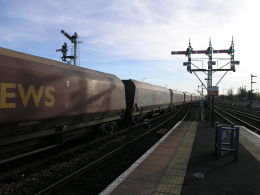Posted 26th March 2010 | 4 Comments
ATOC condemns strikes as Adonis is urged to intervene

THE TRANSPORT secretary Andrew Adonis is being urged to intervene in the industrial dispute which has led to four days of strikes being called.
Talks with Network Rail with the RMT and TSSA broke down at ACAS yesterday.
ATOC has condemned the announcement by the unions that their members will strike during 6-9 April. There are fears of major disruption if the action does go ahead.
The action by signallers will start on Tuesday 9 April and run until Friday, with two four-hour walkouts by signallers each day, between 0600-1000 and 18.00-22.00. The timing is likely to cause maximum disruption to commuter services, but no trains can be guaranteed, though Network Rail said it does have contingency plans. Even so, the company is warning that perhaps only 20 per cent of services will run, although the situation will vary from line to line, with many routes likely to have no trains at all.
The unions continue to insist that the plan to reduce the number of maintenance jobs by 1,500 will jeopardise safety. Signallers are also in dispute with Network Rail over flexible rostering proposals.
Network Rail has denied that safety is an issue. Chief executive Iain Coucher has told Railnews that safety is not in question, and that in any case Network Rail's proposals are being closely scrutinised by the Office of Rail Regulation.
Meanwhile, NR operations director Robin Gisby has accused the unions of ‘living in the steam age’.
As crisis talks begin today between Network Rail and train operating companies to calculate emergency timetables, Lord Adonis is being urged to intervene by the unions, although so far he has declined to become involved with what he sees as an industrial dispute at a private company.
RMT general secretary Bob Crow said: “Despite long hours of talks, we have received nothing concrete from Network Rail that addresses the key issues."
Reader Comments:
Views expressed in submitted comments are that of the author, and not necessarily shared by Railnews.

Joel Kosminsky, London, Britain
Safety is invisible - you only see it when it fails - cutting safety resource is madness. I missed the Potters Bar crash by ten minutes; I'm sold on safety. I'm a former risk assessor and I learned quickly that organisations only appreciate how much safety really costs 'afterwards'. Remind me - who said 'jaw-jaw is better than war-war'... A strike is the last resort. If that gets people round a table, because the employers now know staff are unhappy, that is progress.
annie momteith, glasgow
striking is no longer the answer, do your job or leave plenty or others to take your place , if the bolshy transport unions strike it will mean i will have to miss a vey important event . and they will never get my sympathy. try telling a bunch of servicemen just back from iraq or afganistan how hard your jobs are , see what they say
H Harvey, Birmingham
Over the past few years we have seen tremendous investment in the rail system much of which has simply brought the system close to the that obtained in most of Western Europe.
Rail has now a golden opportunity to capitalise on this investment and in doing so encourage future govermnents to continue with substantial investment including electrification and high speed lines even with the parlous state of the economy.
Mr Crowe and Co are going to poison opinions and make it easy for the enemies of rail in the D(a)fT and the Treasury to claim the rail unions are still living in the past and to invest substantial sums in an industry still living in the past would be fooloish.
Mr Crowe and Co are always pulling out the safety card so why has no one the RMT/TSSA/Network Rail and or the TOCs produced a comparison of conditions between the UK and a sample of rail operators in Europe.
Perhaps Rail News could investigate.
Sam Green, Bournemouth, uk
This is why haulage companys (one of the reasons)wont switch from road to rail!The constant threat of strikes on the railways.